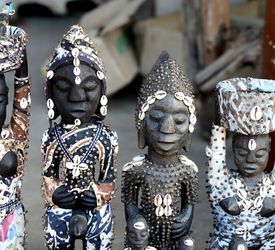The Little Sumo was on holiday with Mummy and Daddy. He sat in the back of the car, intently looking out of the window. Mummy was at the wheel of their old and shabby orange family car, driving toward their hotel. In fact their car had once been orange. Now it was so old an spattered with mud that it had become browny-orange. Daddy was in the front, in the passenger seat. He too was intently looking out of the window.
“I spy, with my little eye, something beginning with H,” said Daddy.
The Little Sumo scanned the people on the pavement. He spotted a policeman. “Hat!” he shouted.
“No,” said Daddy. “Try again.”
Mummy made a suggestion. “Is it a human?” she asked.
“Nope,” said Daddy. “Try again.”
The little sumo scanned the buildings at the side of the road. “House!” he said.
“That’s right,” said Daddy. “Now it’s your turn.”
So the Little Sumo looked ahead, then to the side, and then behind the car.
“Well, hurry up!” said Daddy. “Have a good look around and just pick something you can see.”
The Little Sumo looked through the window and up into the sky. “I spy, with my little eye, something beginning with D,” he said.
“A dog?” suggested Daddy.
“No,” said the Little Sumo. “Try again!”
Mummy made a guess. “Uh… a doughnut?” she said. “I didn’t see that policeman we passed eating one, but I’m quite sure that policemen always have doughnuts.”
“No, Mummy, you’re wrong,” said the Little Sumo. “Try again!”
Daddy spoke next. “A duck? No, there aren’t any ducks. A daffodil? No, there aren’t any daffodils here either. Okay, I give up. What do you see that begins with the letter D?”
“A dragon!” shouted the Little Sumo, happily.
Mummy laughed out loud. “I was just joking about the doughnut. You’ve got to pick something you can actually see,” she said. “You can’t just make something up, like seeing a dragon.”
“But I did see a dragon,” said the Little Sumo, pointing to the sky. “It had big wings and a long neck, and a tail, and it was kind of orangey-brown.”
Daddy twisted in his seat to try to get a better look at the sky. “Well, I can’t see anything,” he said. Maybe it was a bird or a plane.”
“It’s gone now,” said the Little Sumo. “But it was there just before, flying in the sky!”
“Oh!” said Daddy. “I spy, with my little eye, something beginning with B - a betting shop! I want to stop and make a bet on the important horse race today,” he said.
“Oh, Daddy! Do you have to go to a betting shop when we are on holiday?” said Mummy.
“Well, it’s a very big, important race today,” he said. “I just gamble once a year. It’s a kind of tradition. And I might win some money for us to spend on our holiday.” He looked at his watch. “The race will start soon. I think I’ve got just enough time to place my bet.”
So Mummy parked the car while Daddy went into the betting shop. Mummy and the Little Sumo waited in the car for him to return.
After a few minutes, the Little Sumo noticed that his window was trembling slightly, as if the ground under the car was being pushed by a heavy weight. Then he heard a loud sound coming from behind them. Clip-clop, clip-clop. It was getting louder, coming nearer. Clip-clop, clip-clop!
The Little Sumo looked round, out of the back windscreen. “Mummy, look!” he said.
Trotting down the street was a huge white horse. On its back was a knight in shining armour, carrying a bright and long lance.
He spotted their mud-spattered, browny-orange car and gave a great shout. “Huzzah! I’ve got you now and you won’t escape my steel!”
The knight flipped his visor down and lowered his lance, pointing the deadly end forward. Then his horse came on at speed, charging towards the Little Sumo and Mummy in their car.
*
Oh, dear.
I hope that Mummy and the Little Sumo aren’t speared by this knight and
his lance. Will Daddy come out of the
betting shop to the scene of a disaster?
And what happened to that dragon in the sky? Find out in part 2 next time!
Vocabulary:
to do something intently – to do something
with great focus and attention
to be shabby – to be old and in a bad
condition
to be spattered with something – to be randomly
covered with many splashes or little pieces of something. For example, “The workman’s shirt was spattered
with paint.”
to make something up – to invent or create something fictional














